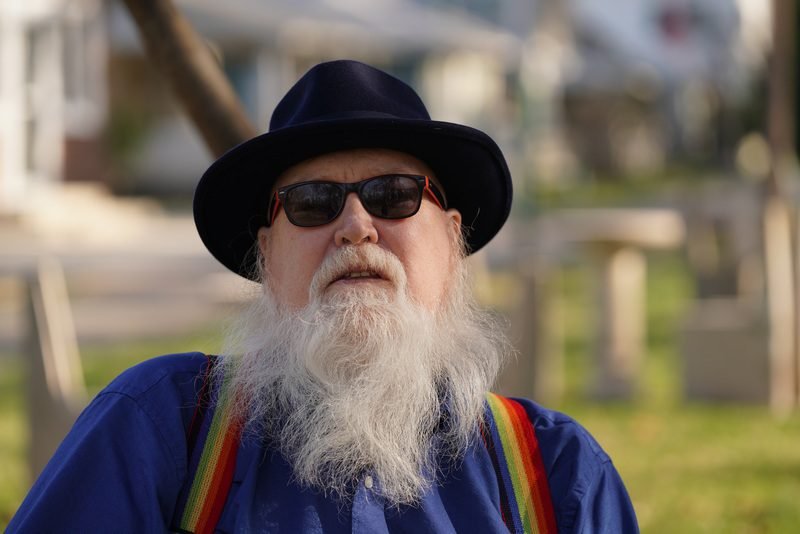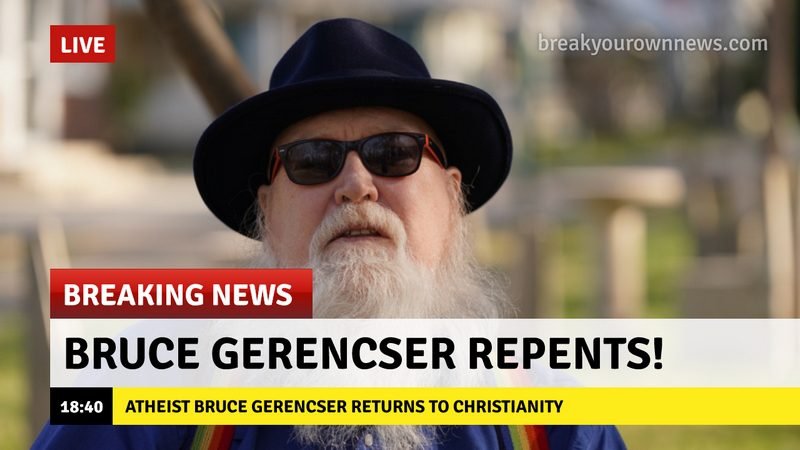
Yesterday, I responded to a Facebook message sent by Evangelical Christian Daniel Kluver to my wife. (Please see Evangelical Man Messages My Wife on Facebook.) Kluver also messaged me, but I didn’t see it at first, thanks to it landing in my spam folder. Evidently, God can’t circumvent spam filters. What follows is Kluver’s message (s) to me. My response is indented and italicized.
Peter ruckman was disliked by many brainwashed preacher boys but he was my favorite teacher because he was a straight shooter! Just because the Bible says in the latter times some will depart from the faith giving heed to doctrines of demons like the nuns that won’t marry doesn’t mean you have to. You should watch demons and Christians by ruckman.
This one paragraph tells me everything I need to know about how Daniel Kluver views the Bible and the world, in general. Kluver is a follower of Peter Ruckman, a thrice-divorced, racist Independent Fundamentalist Baptist preacher (now deceased). (Please see Questions: Bruce, In Your IFB Days Did You Encounter Peter Ruckman?) Ruckman was a nasty, arrogant, self-righteous preacher, as are many of his followers.
In Kluver’s world, people who disagree with his demigod are “brainwashed.” Ruckman was King James-only, going so far as to say that even the italicized words in the King James Bible were inspired by God. Ruckman may be dead, but his teachings about the King James Bible live on, infecting the minds of countless Fundamentalist Baptist preachers. I know numerous preachers who are Ruckmanites, even though they refuse to admit where their theological beliefs came from. These preachers despise the man, but love his doctrines. Ruckman operated a Bible Institute in Pensacola, Florida, churning out clones for decades.
You speak like you were a brainwashed preacher boy and it makes me wonder if you are really saved.
In his message to Polly, Kluver suggested that I was still saved. Now he thinks I am unsaved, that I have been “brainwashed.” By whom, he does not say. As a Christian, I was directed, led, and taught by God himself — the Holy Spirit. Thus, if I was “brainwashed” by anyone, it was God.
I have prayed for god to soften your heart and cut you to the marrow if that’s what it takes.with stents and patches all over our bodies we are in the third quarter of life.
Since God ALWAYS answers Kluver’s prayers (his words), I should expect the Holy Spirit to “soften my heart and cut me to the marrow.” I’m melting, I’m melting! Sorry, I couldn’t help myself. Kluver’s mind is so infected and corrupted with Bible words that he is unable to write using everyday English words unwashed, uncircumcised Philistines such as myself might understand.
I would probably bet that your wife has been a first peter chapter three wife at times.
Kluver says that Polly was, at one time, a First Peter 3 wife. Yes, she still loves peter. 🙂 What Kluver means is this:
Likewise, ye wives, be in subjection to your own husbands; that, if any obey not the word, they also may without the word be won by the conversation of the wives; While they behold your chaste conversation coupled with fear. Whose adorning let it not be that outward adorning of plaiting the hair, and of wearing of gold, or of putting on of apparel; But let it be the hidden man of the heart, in that which is not corruptible, even the ornament of a meek and quiet spirit, which is in the sight of God of great price. For after this manner in the old time the holy women also, who trusted in God, adorned themselves, being in subjection unto their own husbands: Even as Sara obeyed Abraham, calling him lord: whose daughters ye are, as long as ye do well, and are not afraid with any amazement.
Polly was a First Peter 3 wife ALL the time; that is before we realized how harmful and demeaning such teachings were. I can confidently report that Polly is no longer a First Peter 3 wife — and I have lived to tell about it. 🙂
Gods message to you is don’t let your pride get in the way of eternity! The only way you could ever preach gods word and denounce him later is only by devils that you have let surround yourself. Devils perched on both shoulders whispering lies into your mind to block the Spirit of God all mighty!
Ah yes, I am surrounded by devils. As many Evangelicals do, Kluver can’t make my past and present life fit in his narrow Fundamentalist box. Instead of just accepting that I once was a Christian, and now I am not, Kluver scrambles and flails, looking for ways to explain my life. Further, Kluver thinks he has a direct message from God for me. I am “prideful,” and unless I humble myself before Kluver, uh I mean God, I will end up in Hell. You see, Kluver thinks he is in an MMA match with me. His goal is to make me submit.
there is a literal hell and I have found that out before I was saved. God used it as a tool to get my attention and it worked.
No, there’s not. Kluver provides no evidence for the existence of Hell. None, nada, zip. Kluver seems to suggest that he had some sort of experience that proved to him Hell is real. However, I doubt that Kluver has literally and physically visited Hell. If he has, I would sure love to see the evidence for his claim. You know, photos or video? The only hell I see is in this life. The same goes for heaven.
I am going to ask God to pull back his protective hand off of your life if that’s what it takes to get your attention. In case you haven’t realized it yet I asked God to use me and instead of street witnessing like I used to he is using technology. I have to stay prayed up to fight the devil everyday and you saw how he was working on me with the first message I sent you.
Kluver now turns to passive-aggressive threats. He’s asking a non-existent deity to take his hand off of me and cause me physical harm to get my attention. The only thing that concerns me with such threats is that Kluver might think that God wants him to be the means of “punishment.” Do I worry about such people? Sure, a bit. Religion can and does cause people to do all sorts of crazy shit. That said, if I hid every time an Evangelical zealot threatened me, I would never leave my home. Kluver told me today on Facebook: “One thing about you is you are entertaining but I am tired of you and your stupidity.” I reminded him that he was the one who contacted me.
If I don’t see you in heaven then I will see you on judgment day! Take care and god bless!
There is no Heaven or Hell, so Kluver and I will not see other after death. Both of us will most certainly die, but after that? Nothing. Both of us will become worm food or ash. Besides, if there really is a Heaven, why would I ever want to live in the same universe as the Kluvers of the world? No thanks. Give me Hell every time. Better company, and definitely better parties.
Kluver also wrote:
I read your part one about preachers and i am seeing all around me how church leaders are fouled up with relationships.I have been out of a so called church for over a year now. I poured my heart and soul into the congregation and when i retired from drywall contracting and doing most of the work because i was a small business, then i noticed that when i wasn’t fixing holes for almost free i was treated differently.I attended Calvary Chapel of tri cities Washington for twenty years and the friendships had no depth. People used to give me dirty looks when i said show me a pastor that doesn’t cuss and i will show him a screw gun. I have tried to be friends with the preacher and it’s just phony! I am not wired that way and even my old partying friends were better to be around.everytime i got close to the pastor i got really weird vibes from him like he didn’t like me for some reason.Twenty years of that crap was enough! What I saw with Calvary was a dictatorship and I won’t put up with that.if someone asked about the money he would snap back and say what do you want to know for? Sarcastic! I know we can’t quit the church because we are the church.There is something about being in leadership that I see change people in a bad way. I don’t know if I will attend so called church anymore. The southern baptist convention is another thing that really irritates me. They want contracts signed for church memberships! I know that when I got saved I then became a member of the body of Christ and not by some man made crap! I want to read part two of your story.Take care!
I am 64 close to your age.
There is a root of bitterness springing up inside of us towards man. God woke me up seven hours after I messaged you with heavy conviction. Our human nature wants to say that we are done with God but that’s what the enemy wants. I have been praying for both of us that God would yank the bitterness out of us by the roots! If you were really born of the spirit you will get the chastening which is a hug from God because he loves us. I have to say when I prayed with a friend for salvation at 17 years old it was probably a false conversion, just lip service.When I was thirty three years old I was driving to work and got nailed by the Holy Spirit and was truly born again.Thats what satan wants is false conversions because they are deceived. I read part two last night and I have seen the things you said happen to people. Men’s traditions are like doctrine of demons. I am sorry that satan has been attacking us but it’s going to happen when we are effectively touching others by our witnessing and teaching. I will continue to pray for you and your family and ask for Gods will in your lives and mine!
After reading Kluver’s message, I sent him a short reply:
Thank you for the blog fodder. Now fuck off.
Kluver replied:
Hey preacher boy i totally understand how screwed up the independent baptist church is and that’s what they do is brainwash people. I have seen it destroy marriages and they prey upon people who want to please god and they just use em up and kick them to the curb. For some stupid reason pastors think they need to follow the early church in acts and that was a communist outfit.just because these bastards messed with your life from the time you were young don’t let that stop your relationship with god. I have seen the corrupt so called church congregations and I hate it. You can use all the foul language you want to make up for all anger you have. I know I would! If you are truly born again then the chastening won’t be very comfortable and if you don’t get your head out of your ass god just might take his protective hand off of your life! That’s all I got to say!
One more thing. If you throw a rock into a pack of dogs, the one that yelps the loudest just got hit! Telling me to fuck off was your yelp! You are mild compared to the Harley riders I share Jesus with. I just don’t take too much shit from people and for some reason I hope you will get right with the lord!
End of quotes
As readers can see, Kluver is on the outs with organized Christianity. He’s had some bad experiences, and this has, rightly so, affected his view of Christian churches and preachers. What perplexes me is his attack on me personally. What is it about me that irritates him so? As is typical with zealots and apologists, Kluver has read very little of my writing. And this has led him to make all sorts of errant assumptions about my life. Kluver wrongly thinks I was always an IFB preacher. I was not. I left the IFB church movement in the 1980s. I wish the Kluvers of the world would take the time to read my autobiographical work. Doing so would hopefully result in more nuanced and thoughtful interaction with them. Instead, I get the comments and emails featured in this post.
Not that it will matter. Kluver thinks I am saved, lost, headed for Heaven, headed for Hell, under God’s chastisement, or fixing to get chastised by God. Kluver didn’t contact me to gain a better understanding of my story. He’s on a mission from his God, and I am his “target.” Typically, I tell such people to fuck off, but, in Kluver’s case, I thought readers might find his comments and my responses instructive.
Bruce Gerencser, 66, lives in rural Northwest Ohio with his wife of 45 years. He and his wife have six grown children and thirteen grandchildren. Bruce pastored Evangelical churches for twenty-five years in Ohio, Texas, and Michigan. Bruce left the ministry in 2005, and in 2008 he left Christianity. Bruce is now a humanist and an atheist.
Connect with me on social media:
Your comments are welcome and appreciated. All first-time comments are moderated. Please read the commenting rules before commenting.
You can email Bruce via the Contact Form.








